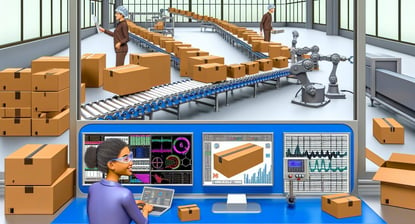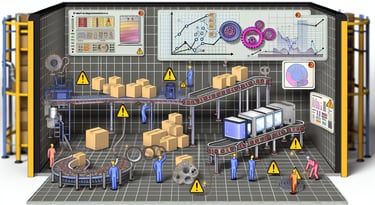Predictive Maintenance Programs in Packaging Manufacturing with Data Analytics and AI
Every minute lost to unexpected downtime or equipment failure can have a significant impact on production schedules, costs, and ultimately, customer satisfaction. That's why forward-thinking manufacturers are turning to predictive maintenance programs powered by data analytics and artificial intelligence (AI) to stay ahead of the curve.
In this blog, we'll look into the benefits and challenges of implementing predictive maintenance in packaging manufacturing facilities, with a focus on integration with enterprise resource planning (ERP), supply chain management (SCM), and manufacturing execution systems (MES), particularly through platforms like PlanetTogether and leading ERP systems such as SAP, Oracle, Microsoft, Kinaxis, Aveva, and others.

Predictive Maintenance
Predictive maintenance is a proactive approach to equipment maintenance that relies on data analysis to predict when equipment failure is likely to occur, allowing maintenance tasks to be performed at the optimal time to prevent unplanned downtime. By monitoring equipment conditions in real-time and analyzing historical data, predictive maintenance algorithms can identify patterns and anomalies indicative of potential issues, enabling maintenance teams to take corrective action before a breakdown occurs.

The Benefits of Predictive Maintenance in Packaging Manufacturing
Minimized Downtime: By detecting potential equipment failures before they occur, predictive maintenance helps minimize unplanned downtime, ensuring continuous production and preventing costly disruptions.
Optimized Maintenance Schedules: Predictive maintenance allows maintenance activities to be scheduled based on actual equipment condition rather than arbitrary time-based intervals, optimizing maintenance resources and reducing unnecessary servicing.
Extended Equipment Lifespan: By addressing issues early and performing maintenance tasks proactively, predictive maintenance can help extend the lifespan of critical equipment, reducing the need for costly replacements and capital expenditures.
Improved Safety: Regular maintenance and early detection of equipment faults contribute to a safer working environment for employees by reducing the risk of accidents and equipment-related injuries.
Enhanced Operational Efficiency: With fewer unexpected breakdowns and better-planned maintenance activities, predictive maintenance contributes to overall operational efficiency, enabling manufacturers to meet production targets more consistently and cost-effectively.

Challenges in Implementing Predictive Maintenance
While the benefits of predictive maintenance are clear, implementing a successful predictive maintenance program in a packaging manufacturing facility comes with its own set of challenges:
Data Integration: Integrating data from various sources such as equipment sensors, ERP systems, and maintenance records can be complex, requiring seamless integration between different systems and platforms.
Data Quality and Accessibility: Ensuring the quality and accessibility of data is crucial for accurate predictive analytics. Incomplete or inaccurate data can lead to incorrect predictions and unreliable maintenance recommendations.
Scalability: As manufacturing facilities grow and evolve, predictive maintenance programs need to be scalable to accommodate increasing volumes of data and expanding operations.
Skill Gap: Implementing and managing predictive maintenance systems require specialized skills in data analytics, AI, and maintenance management, which may not always be readily available within the organization.

Integration between PlanetTogether and Leading ERP Systems
PlanetTogether, a leading production planning and scheduling software, offers robust integration capabilities with leading ERP systems such as SAP, Oracle, Microsoft Dynamics, Kinaxis, Aveva, and others. By integrating PlanetTogether with ERP systems, packaging manufacturers can achieve seamless data exchange and synchronization between production planning, scheduling, and maintenance management functions.
Key benefits of integrating PlanetTogether with ERP systems for predictive maintenance include:
Unified Data Environment: Integration with ERP systems allows for a unified data environment, ensuring consistency and accuracy across production planning, scheduling, and maintenance management processes.
Real-time Visibility: Integration provides real-time visibility into production schedules, resource availability, and equipment status, enabling maintenance teams to prioritize tasks based on production priorities and minimize downtime.
Enhanced Decision-making: By combining production planning data from PlanetTogether with ERP data, manufacturers gain valuable insights for making informed decisions about maintenance priorities, resource allocation, and production optimization.
Streamlined Workflows: Integration streamlines workflows by automating data exchange and eliminating manual data entry tasks, reducing the risk of errors and improving overall efficiency.
Predictive maintenance powered by data analytics and AI holds immense potential for improving efficiency, reducing downtime, and enhancing competitiveness in packaging manufacturing. By leveraging advanced predictive maintenance algorithms and integrating with ERP, SCM, and MES systems, manufacturers can unlock new levels of operational excellence and cost savings.
With the right technology infrastructure and strategic partnerships in place, packaging manufacturers can stay ahead of the curve and thrive in today's dynamic manufacturing landscape. Are you ready to take your manufacturing operations to the next level? Contact us today to learn more about how PlanetTogether can help you achieve your goals and drive success in your industry.